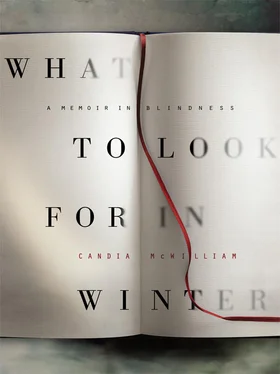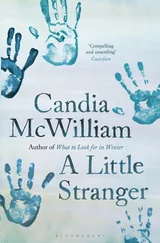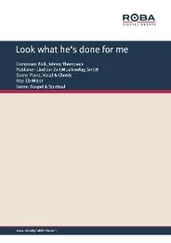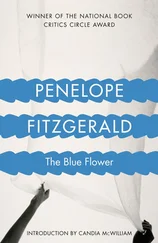In Charles and Robert’s bedroom, my father told me nothing but the truth, upon which he never again enlarged; very likely, for him, the only way.
‘Candia’, he said. ‘You will never see your mother again.’
People ask, ‘Are you angry with your mother?’ I am angry with neither of them though I feel vivid disgust at myself still.
I went down the inside stone stairs and out into Saxe-Coburg Place, a green square; after that, I walked around the quadrilateral autumn pavement, feeling important, shut out, and singular.
I started to tell myself the story on that day whose end is my writing this down. I shall try to tell it as exactly as I can. I thought on that day, whenever it was, that this new swerve in my story made me interesting, but I see that in fact it is a story that makes us connected, not myself singular. It is the story of loss.
That exchange, of desolation for empathy, disclosed itself to me quite close upon my mother’s death, the click of a new consciousness that I would be better advised to listen than to assert when it came to suffering, that it is not a game of trumps, and that the suffering of those one loves cannot but be worse than one’s own.
My poor father read to me all night in the basement at the Robertsons’ house, The Sword in the Stone. Can you imagine his peril and his tiredness? The sheets were linen, an act of sure hospitality on the part of our hostess. Linen sheets are chaste luxury and comfort.
Later, I became a sort of succubus upon the whole Robertson family. I was to do it with other families, too.
That night I had — or so my memory, which is as reliable as my eyelids, tells me — a dream after I fell asleep in the early morning, that foretold the future. I would go away, far away.
If this were a novel, you would learn at what chapter of The Sword in the Stone my father and I eventually fell asleep. Let’s pretend it’s when the Wart becomes a bird of prey and there come the Latin words of the Scots poet Dunbar, from his ‘Lament for the Makars’, ‘Timor Mortis Conturbat Me’.
I don’t know really. I did become rigid with fear that my skinny father would slip away too, and I took, in the coming weeks, to waking him, shaking him awake, like a first-time mother with a baby. What sort of caricature of his dead wife must I have represented at those times, reborn, younger, desperate, alive?
My mother and I were jealous of buildings, first.
My father worked for the National Monuments Record of Scotland and then for the National Trust for Scotland. He was away a good deal, and at first he went on his own. They didn’t have a car in the early years and I imagine that a baby might have been a worry, even if allowed on field trips.
If people mention the conservation of buildings now, they think at once of something almost aspirational, associated with a style of life, a type of person, a version of the past. All this could not be further from how my father thought and worked and lived. He was working to save buildings that were being blown up, set alight, anything to get rid of them and to realise the cost of the land they sat upon and to be rid of the fearful costs they and their upkeep demanded. Roofs were pulled off Scottish houses in order for the rates to be avoided. There was a cull of castles, palaces were dynamited, streets fell to the wrecking ball, squares came down in the name of progress, tenements fell in stone and dust. The war had left the sides of buildings gouged, their innards shockingly exposed, wallpaper making its sad prettiness plain, a chained mirror blitzed to wood and a shard of looking-glass.
I played on weekdays in a playground called the Wreck, down by a bomb crater near Drummond Place. Years later I realised that it was called the ‘Rec’, short for recreation. The swings at the Wreck and at Inverleith Park, where you might catch minnows in a hairnet tied to a pea-stick, were tied up on a Saturday night by the park keeper, so as not to be usable on the Sabbath. Park keepers were renowned among the children who played all day at the playgrounds, and who were worldly-wise, for being great wielders of the belt or the strap. Certainly they fiercely guarded the pavilion in the park at the end of our crescent, where I never really did dare to play, except in the rough grass. Even a fat child could get through the railings that smelt of iron, rust, coally rain and lead paint. After I got thinner I played walking along the railings on the park side. On the side of the houses, most of the railings were topped with flèches , acorns or fleurs-de-lys, except where they had been uprooted to contribute to the war effort. I felt pity in my own body for the hurt buildings, encouraged by my parents, who took me with them everywhere when they were together. Later the National Trust gave Daddy a car for work, a fat Hillman we called the Tank.
I loved to sit in the back, my head against the rattly window, watching the rain make shapes, especially in the dark and under a rug, and most especially of all, when we were going north. The humming window gave me a pitch against which I could sing, like a drone behind a bagpipe; I think the noise I made was worse than any pipe (I love the pipes violently. Until recently, I would have said that they make me hold my head up, but now my failing sight is making me do that too, so let me say that they make my blood race). My father couldn’t abide my mother’s singing, which was flat, nor mine which was flatter, and booming, and often built around long stories whose heroine was me, assisting medically at some point during Bannockburn or helping at a crisis with the Argonauts. I was very keen on Jason.
I was in love always. Odysseus seems to have been its first really intense human object. My mother heard me calling out his name in my sleep when I was six. I’d started reading the Odyssey , in the E.V. Rieu translation, under false pretences. My father said that my mother was reading it because she thought that Homer was some kind of an animal called an Odyssey. He was teasing, but patronising also. In both senses, she wanted his education. That was for sure what I think that I thought, but I don’t remember. I identified with none of Odysseus’s womenfolk, not Athene of the grey eyes, not patient Penelope, not beastly Circe, not tall Nausicaa, head and shoulders above her handmaidens in height, but preferred to confect an extra part for a brave agile young female doctor. I was very taken, when it came to the Iliad , with Achilles for his sulkiness and with Hector for his fearful sufferings; but he was never going to pull through no matter how thoroughly I bandaged him.
Comics were early stirred into the reading mix. With some tact, my father pretended to like comics too and would pay me half the price of my WHAM! in order to ‘read’ it. WHAM! , which had an excellent strip called Georgie’s Germs that had those satisfying battles between microscopic life forms that are always so rich a culture for silliness, cost threepence-halfpenny a week, pronounced, I should perhaps tell you, ‘thruppence haypenny’. Where can one begin to translate?
The source of most comics, especially in Scotland at that time, was the ultra-conservative publisher D.C. Thomson of Dundee, to whose products I was early addicted, and still am. They did not come to our house but I knew where to get them. The Dandy and the Beano I could manage without, but still must have my Broons Annual , my Oor Wullie , reassuring and harrowing in equal part. They have moved with the times. While they were stuck in the forties or so in the sixties, with a few references to Mop-Top laddies or jukeboxes, they are now shockingly less sexist and no one is picked on for being fat and or ugly.
Читать дальше











